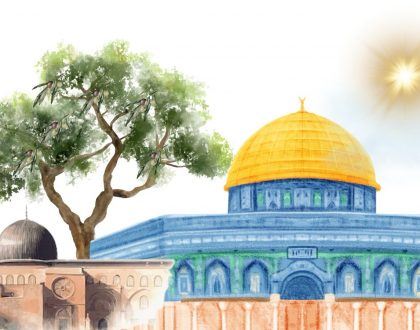Miracles
by Hana
Today we would like to tell you about a selection of the many miracles caused by God. When we say miracles in a religious context, what probably comes to mind for most of us is ‘magical’ or supernatural events that happened to people centuries ago.
God might choose to perform miracles for several different reasons, such as to prove His existence or to help His believers, and he mainly granted them to the main prophets – Abraham*, Moses*, Jesus* and Muhammad*.
So, first of all, we’d like to talk about a few of the main miracles that took place during the life of Abraham*. To start with, the occasion on which God saved Abraham* from a burning fire.
The people of his village disagreed with his preaching to such an extent that they thought it necessary to burn him. They collected large amounts of wood over a period of months, made a giant bonfire, and set it alight. They then tied Abraham*’s hands and feet together, put him on a catapult, and released him into the fire. God said ‘O fire! Be cool and safe for Ibrahim.’ [21:69] The fire only burned the chains which bound Abraham*’s hands and feet; otherwise he emerged unscathed.
Another significant event in his later in his life happened when God tested Abraham* by commanding him to take his wife, Hager, and baby son, Ismail, to a desert and leave them there. Very soon their water ran out and Hager started to panic because she would not be able to feed her child. Leaving her baby on the ground she ran from one mountain to another in desperation seven times, an act that is still commemorated during the pilgrimage – Hajj. The baby became fractious, and started to bang his heels on the ground. Suddenly, a spring started to flow where he had hit the sand, and this not only provided enough water to sustain both him and Hager, but, over time, led over time to the building of a thriving city – Makkah, which continues to give water to this day and has always produced enough water to sustain the city’s population and millions of visitors. Remember, this is in a desert, so it’s pretty amazing!
This water – known as Zamzam – is a miracle in itself. Even though it is completely natural and has never been chemically treated, it has never suffered biological growth, such as algae growing on its surface. It has also been scientifically analysed on multiple occasions, and has been proven to give the body more energy than normal water, and have medicinal properties. Here is a short clip of a German scientist talking about his research into Zamzam water.
So now we’re going to move on to stories of Moses*. There were a huge number of miracles during his life, and it would take more than an entire assembly to cover it all, so we’re just going to mention a few!
The very first miracle in his life – which I believe is also told in Judaism – is widely known as ‘The Burning Bush’. In Islam, the story goes:
Moses* and his family were travelling through the desert, but they got lost, and, as darkness fell, they needed a place to stay for the night. On Mount Tûr (known in English as Mount Horeb) in the distance, Moses* spotted a bright light, and said to his family “Wait, I have seen a fire, maybe I will bring to you from it some news or a brand of fire, so that you may warm yourselves.” [28:29] When he reached the light, he saw that it was actually a tree which, although on fire, was not physically burning, and God spoke to him.
God has spoken directly to very few prophets, and he spoke more to Moses* than any other. He now said “O Moses*! I am God, the Lord of the worlds.” [28:30] He then showed Moses* two miracles, and commanded him to go to Pharaoh and persuade him to accept his message and set the Israelites free. He was also permitted to take his brother Aaron* with him – Aaron* was the better speaker of the two, owing to the fact that Moses* had burned his tongue with a hot coal as a baby and had a slight stammer.
So, equipped with their miracles, the two brothers proceeded to Egypt. When they reached the palace, Pharaoh assembled all his best magicians to show that all Moses* did was just an illusion. Moses* threw down his staff, which transformed into a huge snake, so all the Pharaoh’s magicians promptly turned their sticks into snakes also. However, Moses*’ much bigger snake easily swallowed all of these, before he picked it up and it turned back into just a stick.
He then performed his second miracle – he put his hand under his arm, and when he withdrew it, it was glowing. The Pharaoh ordered his magicians to disprove both of these miracles, but they recognised that, unlike their own tricks, they were not illusions, and swiftly accepted Moses*’ message, as did Moses*’ adoptive mother Asia, the Queen of Egypt and one of four perfect women guaranteed Paradise.
The Pharaoh continued to oppress the Jewish people for months, until finally he and his advisors came to the decision to have Moses* killed. God revealed to Moses* that he should lead the Children of Israel out of Egypt one night in secret.
Moses* and his party fled the city, but soon came to the coast. With Pharaoh and his army chasing them behind, and the Red Sea ahead, all seemed lost, so Moses* turned to God for help. God told him to throw down his staff, and as he did so the sea separated, rising up on both sides and creating a pathway in the middle for the Jewish people to walk through. As they reached the opposite side, Pharaoh and his army were midway through the sea, and the water came crashing down on top of them.
In the 1980s, the mummy of Egypt’s most notorious tyrant was transferred to France, so perplexed archaeologists, surgeons and anatomists could study the body, in an attempt to figure out how it remained intact, even after drowning and being recovered from the sea.
The scientists were shocked to discover that this preservation was known about in Islam over 1400 years before the mummy was discovered in 1898. It is clearly mentioned in the Quran, which says: “So, today, We shall save your [Pharaoh’s] body, so that you may become a sign for those after you.” [10:92]. This amazed the scientist in charge so much that he converted to Islam. He dedicated his life to researching other scientific phenomena mentioned in the Quran, eventually coming to the conclusion that, contrary to popular belief, it is possible to be a Muslim and still believe in science. The pharaoh’s body can still be seen today, in the museum of Cairo.
The prophet Muhammad* experienced fewer miracles than either Moses* or biblical Jesus*, but there were still some, a couple of which we’ll talk about now.
The first of these was the splitting of the moon, which took place about four years after the prophet began openly spreading Islam, by which time the pagans of Makkah were demanding a conclusive sign. Muhammad* prayed to God to send him a sign, and in answer, God split the moon into two halves, on either side of a mountain. NASA has satellite photos of a crack in the moon, and a scientific report states that the only explanation for that crack is that the moon was once broken in half and then re-joined.
Some years later, an event happened during the Prophet Muhammad*’s migration to Madinah, after he was driven out due to persecution. Overnight he and his best friend, Abu Bakr, took refuge in a cave. When his enemies found he was gone, they offered a reward of one hundred camels – a very valuable asset at the time – to the person who found him. God caused a spider to spin its web across the entrance and two doves to nest on a nearby tree, so anyone coming across the cave would not think anyone could be in it. We would like to show you a short clip from a children’s film, illustrating how this saved the Prophet’s life. [play from 50:50 – 52:00]
So, as you have hopefully seen, although miracles may be just stories which you may or may not believe in, some of them are still relevant today, amazing people millennia after their occurrences.
So we’re going to end with a quote from the Quran: ‘And the magicians were thrown down prostrate. They said: “We believe in the Lord of the worlds: The Lord of Moses* and Aaron.”’ [20:70]
*peace be upon him
Written by Hana Khan in 2014
Recommended Posts

Masjid al Aqsa – why it has a very special place in our hearts
November 29, 2023

Palestine: The Holy Land
November 23, 2023

